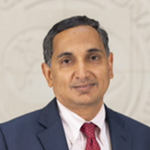Wednesday, Apr 17, 2024 | 10:30 AM - 11:00 AM
Location: Cedar Hall, HQ1-1-660
![]() Click here for the photos
Click here for the photos
OVERVIEW
Changyong Rhee, Governor of the Bank of Korea, will discuss how he has navigated Korean monetary policy through the past two years of inflation shocks, supply chain disruptions, swings in the tech cycle, and fluctuations in global interest rates, and take a look forward at forces shaping the outlook for Asian economies.
REPORT
Key Points:
Communicating monetary policy. Historically, the Bank of Korea’s Monetary Policy Board has kept some “strategic ambiguity” as the most important element for their communication. In the last few years this has changed and more information on the views of Monetary Policy Committee Members about the policy course for the next three months is shared with the public. Currently there are some considerations to expand this to a longer time horizon.
Monetary policy and financial stability. Korea relies on the separation principle, where they approach financial stability separately from monetary policy and inflation targeting. Communication of policy decisions in such framework can be challenging, for example when liquidity to financial institutions and nonbank institutions was provided with high exposures to real estate, while at the same time monetary policy was tightened.
Interest rate path. Timing of interest rate cuts as the inflation is declining is a pertinent current operation issue for Korea. When markets began to stabilize last year and major central banks indicated their intention to pivot rates, the Bank of Korea saw scope for decoupling from the US and possibly cut rates sooner. However, due to continued elevated headline inflation, which remains higher than core, as well as shift in expectation relating to US monetary policy, which affected the Korean exchange rates, and uncertainty related to geopolitical tensions, they decided to hold the rates for the tenth consecutive time.
Quotes:
“As we are at the other extreme [when it comes to providing information about monetary policy] I see merit in revealing more information to the public. I believe that would be very helpful to enhance our capacities too without revealing information on how we can judge whether we are right or not.” Chang Yong Rhee
“On the lessons we can learn from our experience [in combating inflation], one of the most important is that we have to review how effective macroprudential policies are in preventing [market vulnerabilities] ex-ante, and Korea is a good example in how macroprudential policies didn’t work how they were meant to ex-ante, requiring a review in how to make them more effective.” Chang Yong Rhee
Blurb:
With the fight against inflation in its last mile, what is the Korean perspective on the path of policy rates going forward, how are monetary policy decisions communicated to the public, and how will Bank of Korea balance monetary policy and financial vulnerability considerations?
Contributor: Dannah Al-Jarbou
SPEAKER

Changyong Rhee
Governor, Bank of Korea
Chang Yong Rhee currently serves as the Governor of the Bank of Korea and is a member of the Board of Directors of the Bank for International Settlements (BIS). Recently, he has chaired the BIS committee on the Global Financial System (CGFS). Dr. Rhee has accumulated more than 30 years of professional experience as an economist, financial advisor, and academic, attesting to his extensive knowledge and expertise in these fields.
Prior to assuming his current role on April 21, 2022, Dr. Rhee served as the Director of the Asia and Pacific Department at the International Monetary Fund (IMF), where he oversaw the Fund’s work across the region. Before joining the IMF in February 2014, he was the Chief Economist at the Asian Development Bank (ADB). Dr. Rhee has also held several high-profile positions in the Korean government, including serving as the Secretary General and Sherpa of the Presidential Committee for the 2010 G20 Seoul Summit, as well as Vice Chairman of the Financial Services Commission (FSC) and Chairman of the Securities and Futures Commission of Korea.
In addition to his public service career, Dr. Rhee was a Professor of Economics at Seoul National University and an Assistant Professor at the University of Rochester. He has been an active policy advisor to the Korean government, including to the Office of the President and to the Ministry of Economy and Finance, as well as to the Bank of Korea and to other institutions.
Dr. Rhee has published extensively on macroeconomics and financial economics, as well as on the Korean economy. He holds a Ph.D. in economics from Harvard University, and an undergraduate honors degree in economics from Seoul National University.
MODERATOR

Krishna Srinivasan
Director, Asia and Pacific Department
IMF
Krishna Srinivasan is the Director of the Asia and Pacific Department (APD). In this- capacity, he will oversee the institution’s work on all countries in the Asia-Pacific region. He was previously a Deputy Director in APD, overseeing the work on several systemically important countries, including China and Korea. Prior to that, Krishna was a Deputy Director in the Western Hemisphere Department (WHD), where he oversaw the institution’s work on several countries in the Americas, including Brazil, Canada, Mexico, Peru, Ecuador and the island economies of the Caribbean, the department’s research activities, and its flagship product, Regional Economic Outlook (REO) for Latin America and the Caribbean. He is a co-editor of two recent books: Brazil—Boom, Bust and the Road to Recovery; and Unleashing Growth and Strengthening Resilience in the Caribbean. Before joining WHD, Krishna was the IMF’s mission chief for the United Kingdom and Israel, when he was a staff member of the European Department, and before that in the Research Department, where he led the IMF’s work on the G-20 in the context of the global financial crisis. In the context of this work, he and was the editor of an IMF book Global Rebalancing: A Roadmap for Economic Recovery. Krishna has been with the IMF since 1994 and has served in several departments across the institution. He secured his PhD in International Finance from Indiana University and a Master’s from the Delhi School of Economics, India, and has published several papers both at the IMF and in leading academic journals.